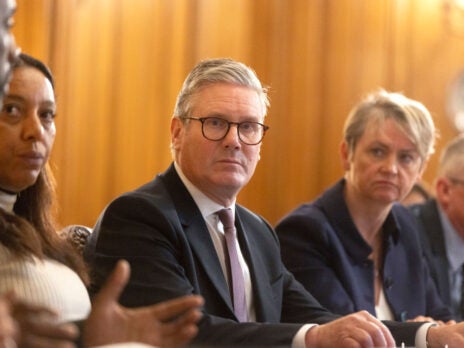
For the average British politics watcher in 2022, there are three certainties in life: death, the rising cost of living, and Keir Starmer disappointing everyone at Prime Minister’s Questions.
Last week’s performance (8 June) wasn’t the first that sent watchers into a spate of groans. The leader of the opposition, once again, ignored an open goal (this time in the form of rebellion against the Prime Minister). PMQs isn’t the poll-shaping, impression-changing event we political junkies want it to be – the time spent keeping up with politics by the average voter is minuscule – but political events such as these do shape the perceptions of the people who cover them for newspapers and TV, meaning Starmer’s disappointing performances are likely to lead to disappointing coverage elsewhere.
How much of a problem is this? Currently Labour is beating the Conservatives by a margin of five to six percentage points in the polls. While not as great as the 20-point lead some commentators were adamant was achievable, that represents clear progress from Labour’s 2019 election result. If an election were held today, Starmer would almost certainly be entering Downing Street with Labour the largest party in parliament, albeit 20 or so seats short of a majority.
We should not forget, however, that we are two years away from the next general election being due. Apathy towards the incumbent party from its supporters is somewhat inevitable in a period like this, and generally those supporters do rally, at least partly, for polling day. While a five-point Labour lead should be good enough in a campaign, it shouldn’t be thought of as impregnable two years out from one.
This raises two questions. First, could Labour be doing better? And second, is Keir Starmer the problem?
The answer to the first is almost certainly. But on the second, there are perception problems with Labour itself that have yet to be unpicked, and these have little to do with the party’s present leader. On identity, it struggles. Its perceived credibility on the most important issues of the day are mixed. It is much improved from where it was under Ed Miliband and Jeremy Corbyn, but as a brand Labour is still untrusted on the economy. The Labour leads you see over the Tories on economic issues have more to do with the Tories falling than Labour rising. I’ve been writing that line for over a year now. It’s a boring, exhausting line but it’s true. Nothing has changed. Voters aren’t yet enamoured with Labour, they’re just overwhelmingly turned off from voting Tory. While there have been a number of Tory converts to the Labour cause – more than there were last year – they aren’t as significant as the number of Tory converts to apathy.
What is interesting is that Labour is not benefiting wholeheartedly here. Starmer looks likely to be Labour’s first leader to win an election since 2005, but the statistical fact is he’s not much of an attraction. He’s polling better than Corbyn and Miliband, but that isn’t saying much. In a fascinating open-ended poll by JL Partners on what voters thought of Keir Starmer, 50 per cent offered a negative view. Just 26 per cent said something positive.
The verdict on Starmer, two years into his leadership, is an awfully bland one: boring. Bland, too, made an appearance in the list of words voters used to describe him, as did useless, weak and untrustworthy. The main positive traits were honest and competent, but they looked awfully isolated in a word cloud of the data by James Johnson, JL Partners’ co-founder.
Boring might not necessarily be a bad thing, as Martha Gill argued for the New Statesman in March, but there’s a difference between voters thinking you’re boring and thinking you’re non-existent. To too many voters, Starmer is a non-entity. They barely know who he is, let alone what he stands for.
This is causing problems. There are two main reasons why soft Conservative voters are reluctant to turn to Labour. One is a perceived lack of competence from Labour; “they would spend too much” is the view of 26 per cent of soft Tory voters in work done by Chris Curtis for the Labour-aligned think tank Progressive Britain. The other – more important, in my view – reason cited is “they are unclear about what they stand for”. Starmer and Labour are the opposition, the de facto alternative to the government. Yet voters, including those who might be sympathetic to Labour, are unclear about what to think because they are unclear about what the party is anymore.
We often forget that after David Cameron ascended to the Tory leadership in December 2005, he failed to make a significant impression on the public for two years. As late as 2007 you had Conservative MPs hankering to be rid of him, fearful that his campaign to soften the Tory brand would turn off the base. His numbers looked similar to what we’re currently seeing for Starmer: a non-existent figure failing to make the political weather. But when the financial crisis hit and Gordon Brown called off an early election, everything changed. It was then that Cameron started to connect with voters; it was then that they were willing to give him a hearing, enabling him to capitalise on the desire for change.
Cameron proved able to animate voters and make use of apathy. Starmer’s Labour isn’t proving quite as successful, even though a crisis in the cost of living is in full swing and the Prime Minister is resented in the extreme.
In a previous post I wrote about how Ukip, Brexit and Boris Johnson have all pushed the electorate into being swingers, their tribal loyalties frayed. Britain’s electoral battlefield has never been better for the opposition, but to too many voters, Starmer doesn’t exist. The party’s problems go beyond its leader and are harming its ability to talk to the country, but two years into his leadership Starmer should be taking some responsibility for that.


